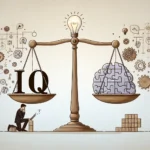Understanding the Relationship Between IQ and Problem-Solving Skills
Are you curious about how your IQ, or Intelligence Quotient, impacts your ability to solve problems effectively? The relationship between IQ and problem-solving skills is a topic that intrigues many individuals seeking to understand the mechanics behind human intelligence and its practical applications.
IQ as a Measure of Cognitive Ability
IQ tests are designed to measure a range of cognitive abilities believed to be indicators of general intelligence. These abilities include logical reasoning, mathematical skills, spatial relations, and verbal comprehension. Historically, IQ scores have been used as predictors of educational achievement and are often correlated with various measures of success in life.
Problem-Solving Skills: A Multifaceted Competence
Problem-solving involves identifying complex issues and finding effective solutions. This process requires a blend of creativity, critical thinking, and the application of knowledge. Whether in everyday situations or specialized professional contexts, problem-solving skills are essential for overcoming obstacles and achieving goals.
The Correlation Between IQ and Problem-Solving Abilities
Research indicates that there is a positive correlation between IQ and problem-solving skills. Individuals with higher IQ scores tend to perform better on tasks that require the application of problem-solving strategies. This is in line with the view that general intelligence provides an individual with the cognitive resources necessary to analyze situations, understand the relationships between different elements, and devise innovative solutions.
Does High IQ Guarantee Superior Problem-Solving Skills?
While there is a correlation between IQ and problem-solving skills, it is crucial to note that a high IQ does not guarantee superior problem-solving abilities. Problem-solving also depends on domain-specific knowledge, experience, emotional intelligence, and practical wisdom. Moreover, personality traits such as persistence, open-mindedness, and the ability to collaborate with others play significant roles in effective problem solving.
The Role of Education and Experience in Enhancing Problem-Solving Skills
Education and experience significantly impact the development of problem-solving skills. Exposure to various problem-solving scenarios, both in educational settings and real-life experiences, can sharpen an individual’s ability to navigate challenges. Active learning and critical thinking exercises can also enhance one’s capacity to apply intelligence in practical and innovative ways.
Conclusion
In summary, IQ provides a foundation for problem-solving skills by equipping individuals with the cognitive abilities necessary to process information and tackle challenges. However, the most efficient problem-solvers are often those who combine their cognitive abilities with a wealth of knowledge, experience, and the right attitude. As we continue to explore the depths of human intelligence, it’s clear that IQ is just one piece of the complex puzzle that is problem-solving. To develop and refine problem-solving skills, it’s essential to engage in continuous learning and apply oneself to diverse and challenging situations.

